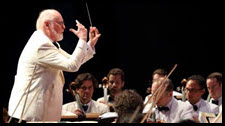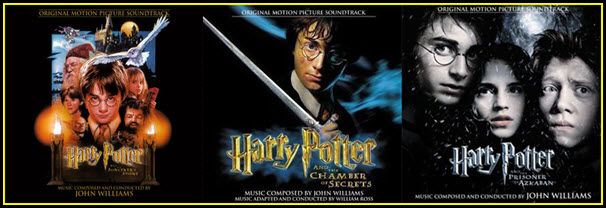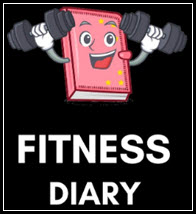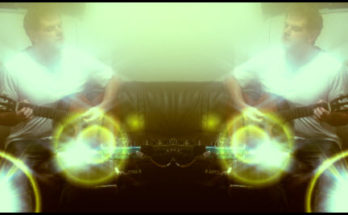John Williams beginning work on Steven Spielberg’s adaption of Roald Dahl’s The BFG at the end of 2015 provided incentive to revisit his previous scores for films also based on popular and magical British children’s books. While Hook (1991) could also be included in that subset, Williams’ Harry Potter scores are the scores I have in mind for this post.
Williams scored the first three of the eight Harry Potter films. For those familiar with the books and movies, those three need no introduction, but for the sake of clarity they are Harry Potter and the Sorcerer’s Stone (2001), directed by Chris Columbus; Harry Potter and the Chamber of Secrets (2002), also directed by Chris Columbus; and Harry Potter and the Prisoner of Azkaban (2004), directed by Alfonso Cuaron. In writing those scores, Williams, as he has done on so many other occasions, has developed a body of work that perfectly captures the world dreamt up by J.K. Rowling as envisaged by Misters Columbus and Cuaron.
Although he scored only the first three of the eight Harry Potter films, his themes laid the foundation for the three composers that followed in his footsteps, and it is his music that lingers in the public consciousness as the music of Harry Potter. Hence, when Universal Studio’s The Wizarding World of Harry Potter opened, it was Williams who was called upon to music up the night.
Fifteen years ago (has it really been that long?), I remember listening to Williams’ Harry Potter and the Sorcerer’s Stone score for the first time on my futon in my one-room Kyoto apartment. As a fan of the books and of Williams, I had been particularly excited to hear Williams’ take on the material. Since then, Williams has scored 18 more films including two further Harry Potter films and three more Star Wars films. He also composed five concerti and various other concert works. While the number of my own compositions has remained at zero, I have over the same period expanded significantly my list of favorite and frequently listened to composers to include Bear McCreary, Michael Giacchino, Joe Hisaishi, Alexandre Desplat, and Murray Gold to name a few. Thanks to Mr. Jobs, their music is always in my pocket and never far from my ears.
With such an abundance of music at hand, it shouldn’t be surprising that Williams’ first Harry Potter score had been missing in action for so long. Granted, a few of the major pieces including the concert arrangements “Hedwig’s Theme” and “Harry’s Wondrous World” are staples of my often played “Best of Williams” playlists, but the score proper has not been listened to in full in a good while. Here are those two iconic tracks which contain music most often identified with Harry Potter. Regarding “Hedwig’s Theme”, here is an analysis which is as fascinating as it is deep and knowledgeable. I wish I had such an understanding of this thing we call music that I love so much.
On a cold wintry January morning, I listened to Williams score for Harry Potter and the Sorcerer’s Stone from start to finish for the first time in perhaps a decade. There has always been something about the combination of music and movement which helps me to more enjoy music. It’s not quite dancing, but it also feels more musical than listening sans movement. It sounds slightly cliche, but the combination of music and walking really does add up to something greater than the sum of their parts.
Returning to the first score with fresh ears, I was surprised at how vibrant and simply how full of musical ideas the score is. There are numerous musical gems beyond the major themes scattered throughout the rest of the score. Those melodic fragments, which a lesser composer would I’m sure be happy to be remembered for, come and go with seemingly effortless ease.
I had almost entirely forgotten the Sorcerer’s Stone motive that is featured towards the end of “Daigon Alley and Gringott’s Bank” and later combines with Voldermort’s winding, sinister snake-like theme in “The Face of Voldermort”. The stone motive receives its boldest rendition in “Meeting Tom Riddle” from Harry Potter and the Chamber of Secrets (2002). All Williams needs is just a few notes – coupled with his encyclopedic knowledge and mastery of harmony – to create a sense of the supernatural.
I love Williams in that eerie supernatural/sci-fi mode. Thankfully, it is a mode he has been called upon to employ on many occasions throughout his long and distinguished career. The most notable examples are the seance music for Alfred Hitchcock’s Family Plot (1976), the Kyptonian crystal motive from Superman The Movie (1978), and the ark and crystal skull themes from Raiders of the Lost Ark (1981) and its third and least sequel Indiana Jones and the Kingdom of the Crystal Skull (2008).
In addition to the score proper, Williams also created a suite drawn from his first Harry Potter score. Williams reportedly recorded the suite at the end of the first film’s recording sessions, but sadly it has not been released. He has performed the suite in concert though, and he later added pieces from the two sequel scores. Here are excerpts from that suite with commentary by the composer himself:
After listening to the first score a few times, I turned to its two sequel scores. Williams’ scores for The Chamber of Secrets (2002) and The Prisoner of Azkaban (2004) are quite unique in terms of their differences and similarities to the first score. The second second is as similar to the first as the third is different. The similarities of the first and second scores are part explained by Williams surrounding schedule.
In terms of movies released, 2002 was one of Williams’ busiest years. Not many people are busier than normal the year they turn 70; it’s safe to say the opposite is true for most mortals. In addition to The Chamber of Secrets, he scored in quick succession Star Wars Episode 2: Attack of the Clones, Minority Report, and Catch Me If You Can. Furthermore, he began the year by composing the theme for the 2012 Salt Lake City Winter Olympics which he conducted in freezing temperatures at the opening ceremony in February:
That tight schedule saw Williams pass the conducting and some arranging duties to William Ross for the first sequel. Although Williams wrote new themes, the sequel score has more in common with its predecessor than all of Williams’ other sequel scores with several passages from the first film appearing in the second almost unchanged. The final denouement pieces for example are identical in parts. Also reused but with an improved and more resounding finish is the previously mentioned end credits piece “Harry’s Wondrous World”.
In terms of the overall feel of the second score, it feels more like an extension of the first rather than a separate score. That’s not a criticism as the films were both directed by Chris Columbus and are very much in the same vein stylistically and emotionally. Not to mention the fact Williams spent less time on the score than his normal schedule allows. Williams did, however, write some new themes and new music appears throughout the score. Around 70% (just a rough estimate) of the music on the soundtrack is new, so the second score is by no means a mere facsimile of the first. Of the new themes which include themes for Doby, the house elf, Professor Gilderoy Lockart, and the Chamber of Secrets itself as well as a rousing piece for Harry’s trip to Hogwarts in a flying car, my absolute favorite is “Fawkes The Phoenix”.
While the second score is similar to the first, the opposite is true for Williams third and final Harry Potter score for Harry Potter and the Prisoner of Azkaban. Williams’ score could not be any more different from the first two. There is really nothing, save for a couple of minutes and a few bars here and there on the soundtrack album to connect it to the previous scores. Some of the action music wouldn’t be out of place in a Star Wars movie and Williams beautiful new pastoral theme called “Window To The Past” wouldn’t be out of place in a 19th Century period drama set in rural England.
In comparing his third Harry Potter score to Williams’ numerous other sequel scores, it is most similar to Jurassic Park: The Lost World (1997) in that Williams kept snippets of famous themes but essentially wrote a new score from scratch.
The soundtrack also includes pieces which do not sound anything like Williams’ previous 100 plus scores. The combination of working with a new director, a darker story, and more mature characters are the likely reasons for the departures from the previous two scores. Whatever the reasons, the result is a score that features some of Williams best and most distinctive writing. Other highlights include a mischievous melody for a Shakespeare lyric from Macbeth and a thundering, soaring piece for Harry’s flight on Buckbeak’s back:
While the plethora of new and different themes for the third film are a joy to behold, the end credits suite as presented on CD is a curiosity. Williams often creates a unique suit of themes for the end credits sequences. Perhaps the best example is the end credits of Star Wars Episode 5: The Empire Strikes Back (1980) which presents the film’s new themes for Yoda, Darth Vader, and Han Solo’s developing relationship with Princess Leia in entirely new arrangements all seamlessly joined with each other and with music from the first Star Wars score:
In stark contrast to the above is “Mischief Managed”, the end credits for The Prisoner of Azkaban which for the most part edited together tracks from the CD. The piece begins with the flying music from the first film followed by a brief statement of “Hedwig’s Theme”. That is followed a couple of minutes of orchestral bliss courtesy of Williams’ melody for “Something Wicked This Way Comes” which for me is the highlight of the score. That new arrangement segues into the medieval arrangement of the same piece from the rather comical track “Professor Hagrid”.
The next nine minutes of the 12-minute piece consists of edited-together segments from “A Window To The Past” which segues (if that’s the right word for a simple fade in and out) into “Buckbeat’s Flight” which segues into “The Snowball Fight.” That’s followed by the the vocal version of “Something Wicked This Way Comes”. “The Knight Bus” is next, and that is followed by “Aunt Marge’s Waltz”. A ten-second quote of “Hedwig’s Theme” closes the piece.
Trying to stay positive, at least the piece illustrates the score’s diverse plethora of themes, but the hodgepodge feels like an opportunity wasted. What I had hoped for was a suite that could only have been created by the one and only John Williams ala the previously mentioned end credits suite from The Empire Strikes Back as opposed to the one we were given, 80% of which needed no musical skill to put together.
Granted, the Star Wars prequels all feature end credits which include similar inclusions of copy-and-pasted concert arrangements of the new themes, but there has never been such a hodgepodge of such differing material lifted straight from earlier tracks of a CD release. I really can’t imagine that was Williams’ idea. Having said that, the score in total expands significantly the musical world Williams created for Harry Potter, and the new pieces are classic Williams.
While enjoying film music is mostly a solitary passion of mine, it is always nice to read of others discovering and experiencing the wonder of John Williams and film music in general. One way film music can be discovered and experienced is at the concert hall.
Pieces of film music have long been programmed either within concerts that include more classical fare or as part of concerts wholly dedicated to film scores. I had the pleasure of seeing Williams conduct the London Symphony Orchestra four times back in the summer of 1998. One significant recent development beyond concerts dedicated to film music has been live performances of complete film scores at showings of their films either at outdoor venues or in concert halls.
John Williams conducted his ET score to picture at The Hollywood Bowl to mark the film’s 30th anniversary in 2002. The film was also accompanied by its score in 2015 with conducting duties performed by composer David Newman who played violin on the original soundtrack.
Howard Shore’s music for Peter Jackson’s The Lord of the Rings trilogy was treated to live orchestral performances to picture as well as a six-movement orchestral suite drawn from the scores for concert performance. Shore’s music for The Hobbit trilogy was also recently arranged into a four-movement symphonic suite. Michael Giacchino’s Star Trek Beyond score was performed with the film at its premier. Other John Williams scores recently given similar treatment include Raiders of the Lost Ark, Jurassic Park, and Home Alone.
Beginning in 2016, the entire Harry Potter series is set for the same treatment. In addition to Williams scores for the first three films, three other composers wrote music for the remaining films. Patrick Doyle scored the fourth film, The Goblet of Fire (2005); Nicholas Hooper scored the fifth and sixth films, The Order of the Phoenix (2007) and The Half Blood Prince (2009); and Alexandre Desplat scored the The Deathly Hallows Part 1 (2010) and The Deathly Hallows Part 2 (2011) . All are destined for world-wide performances. Speaking of Alexandre Desplat, he is currently again expanding musically a world first defined by John Williams in the form of Rogue One: A Star Wars Story.
I can think of no better way to introduce children (and adults) to the wonders and possibilities of orchestral music than through concerts which combine their favorite movies and characters with wondrous scores performed live. Such concerts – events rather – typically sell out bringing much needed revenues into the coffers of cash-strapped orchestras. Here is a review of the most recent Harry Potter concert.
I started this blog post some eight months ago after reading about Williams beginning work on Steven Speilberg’s The BFG. Since then, I’ve been slowly tinkering with this post sometimes daily sometimes not at all for weeks at a time. This post, and a few others like it, are really just attempts to help me get into the habit of writing more. Since music and in particular the music of John Williams means so much to me, it is as good a topic as any to exercise my fingers and writing muscles. As such, there was no rush and certainly no deadline. It is then perhaps fitting that I would finally come to think of this as piece as finished the day after watching The BFG. I have had the score for some 8 weeks now, and it has slowly grown on me, but to hear the music matched to the visuals it was composed for served to increase my appreciation and understanding of Williams’ score. Here is the end credits suite which thankfully Williams did construct with new arrangements of the score’s major themes.
I’ll return to the music of Harry Potter to finally wrap this post up. As an amateur guitarist of some skill and a budding pianist, I have enjoyed playing simplified arrangements of my favorite film themes on both instruments. The music I enjoy listening to is a wonderful motivator for me. I’ll wrap up this post by sharing some performances on piano and one on guitar of some of Williams’ of Harry Potter themes that are not simplified. I’ll never play piano this well, but it’s still a goal worth striving for. Who knows, with a lot of hard work and perhaps a touch of magic?
With Williams recently returning to Star Wars and also planning to pen more music for archaeologist Indiana Jones, perhaps Williams will in the not-too-distant future once again sit at his piano, pick up his pencil, and turn to the magical world of Harry Potter to create new magical music. Of course I hope he does, but if not, he has already created a body of work that will be long remembered, performed, and loved.



